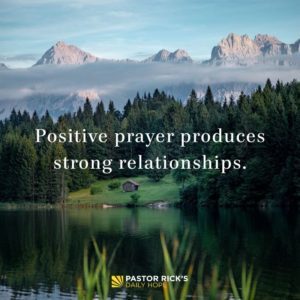Rick Warren's Blog, page 417
October 11, 2019
Understand that God Is on Your Side

No matter what you’re going to face this next week, you won’t face it alone. God is with you, he is in you, and he is for you.
Philippians 2:13 says, “God is working in you, giving you the desire and the power to do what pleases him” (NLT).
“God is working in you.” The word “working” in Greek is the word energos, from which we get our word “energy.” God is the energy driver in your life. You’re not just going on willpower. You’re not just going on your own power. God says he will give you the power you need, no matter what you’re facing.
Not only is he in you, he also is with you. The Bible says, “I will not leave you as orphans; I will come to you . . . On that day you will realize that I am in my Father, and you are in me, and I am in you” (John 14:18, 20 NIV). That’s quite a promise! The Bible says Christ is in you, the Bible says you’re sheltered with Christ, and the Bible says you’re sealed with the Holy Spirit. That means for the Devil to get to you, he’s got to get through the Trinity! That’s a pretty good protection. That is a great fear reliever.
Not only is God with you and in you, God is also for you. Romans 8:31 says, “If God is for us, no one can defeat us” (NCV).
When a shepherd leads the sheep, guard dogs stay at the back, nipping at the sheep to keep them moving in the right direction.
The Bible says that the guard dogs in your life are God’s goodness and mercy. God gives you the things you don’t deserve—that is his goodness. And he doesn’t give you the things you do deserve—that’s his mercy.
Get up every morning and say, “God, thank you that you’re going to be with me today, you’re going to be in me today, and you’re going to be for me today.”
Isn’t that great news? God is with you, God is in you, and God is for you.
The post Understand that God Is on Your Side appeared first on Pastor Rick's Daily Hope.
October 10, 2019
Los Planes de Dios Comenzaron para Ti, antes que Nacieras

“Antes de formarte en el vientre, ya te había elegido; antes de que nacieras, ya te había apartado”. Jeremías 1:5a (NVI)
Si quieres vivir una vida con propósito y significado, maximiza las fuerzas que Dios te ha dado. Encuentra maneras para hacer más de lo que haces bien y menos de lo que no haces bien.
Una razón de esto, es porque Dios te creó para ser único, y te conectó para un único propósito. La Biblia dice: “Antes de formarte en el vientre, ya te había elegido; antes de que nacieras, ya te había apartado” Jeremías 1:5a (NVI).
Tú puedes descansar en la verdad que Dios tiene planes sagrados para ti. Él te dio forma de antemano para esos planes. Los planes de Dios para tu vida no comenzaron desde el momento en que naciste. Esos planes comenzaron antes de tu nacimiento, la Biblia dice que Dios te formó en el vientre de tu madre.
Pero aquí está la mejor parte. La forma en que Dios te moldeó revela cómo quiere usarte. En otras palabras, si quieres saber lo que se supone que debes hacer con tu vida, tienes que mirar atenta y profundamente cómo Dios te ha conectado.
La F.O.R.M.A. —tu formación espiritual, oportunidades del corazón, los recursos, mi personalidad y los antecedente— que Dios te dio, revela tu propósito. Aparta un tiempo para descubrir tu propósito, basándote en cómo Dios te moldeó.
Escucha la enseñanza de hoy del pastor Rick
Reflexiona sobre esto :
Considera lo que haces bien y cómo Dios te ha conectado. ¿Qué lecciones puedes sacar de eso? ¿cómo Dios quiere usarte para Su obra?
¿Qué cosas hacen que sea difícil para ti averiguar cómo Dios te ha conectado? Pídele a Dios que te dé discernimiento sobre esto, y pídele a algunos amigos que compartan lo que ven en ti – piezas que pueden revelar cómo Dios te conectó.
¿Qué piensas de la verdad de que Dios tenía un propósito para ti antes de que te pusiera en el vientre de tu madre? ¿Cómo podría cambiar eso?
The post Los Planes de Dios Comenzaron para Ti, antes que Nacieras appeared first on Pastor Rick's Daily Hope.
Positive Prayer Produces Strong Relationships

Paul didn’t just pray for people in his life; he prayed for them with joy!
There are things in other people’s lives that you’d like to change. You don’t want to change yourself; you want them to change. We always want to change other people. But you can’t!
You can, however, pray and let God do his work in other people.
Positive praying is more effective than positive thinking. All the positive thinking in the world isn’t going to change your spouse or your child or your friend or your situation. Positive thinking can change you, but it won’t change somebody else. But positive prayer can make a difference in someone else.
What’s the quickest way to change a bad relationship to a good one? Start praying for the other person! It will change you, and it can change the other person.
Paul even told us how to pray for others: “And this is my prayer: that your love may abound more and more in knowledge and depth of insight, so that you may be able to discern what is best and may be pure and blameless for the day of Christ, filled with the fruit of righteousness that comes through Jesus Christ—to the glory and praise of God” (Philippians 1:9-11 NIV).
From these verses, we can learn to pray for the people in our lives in four ways:
Pray that they will grow in love: “And this is my prayer: that your love may abound more and more in knowledge and depth of insight.”
Pray that they will make wise choices: “. . . so that you may be able to discern what is best . . .”
Pray that they will live with integrity: “. . . and may be pure and blameless for the day of Christ . . .”
Pray that they will become like Jesus: “. . . filled with the fruit of righteousness that comes through Jesus Christ—to the glory and praise of God.”
Pray these for yourself and anyone else in your life, and watch how God turns around the relationship that seemed hopeless or that needed to be revived.
The post Positive Prayer Produces Strong Relationships appeared first on Pastor Rick's Daily Hope.
October 9, 2019
Selective Memory: Focus on the Good Times

Paul wrote the book of Philippians to the church that he started in Philippi, where a woman named Lydia opened up her home and, along with others, welcomed Paul to the city. The Philippian church even helped fund Paul’s missionary journeys. In Philippians 1:5, Paul says, “I thank God for the help you gave me” (NCV).
The thing is, Paul didn’t have a good time in Philippi. In fact, it was one of his roughest churches to get started. When Paul went to this city to start a church, he was beaten, whipped, humiliated, falsely arrested, thrown into prison, and survived an earthquake. Then he was politely asked by the city leaders to leave town.
Yet Paul told the believers, “Every time I think of you, I give thanks to my God” (Philippians 1:3 NLT).
What is Paul doing there? He is choosing selective memory. Philippi was not a happy place for Paul, and he endured a lot of persecution and suffering during his time in that city. But he chose not to dwell on painful memories. Instead, he expressed his gratitude for the good things that had been done for him and through him.
The longer you know someone, the more likely you are to take that person for granted, look for faults, and remember the bad things instead of the good things.
Are you still clinging to some painful memories with some people in your life? You’ve never let them off the hook, and you can’t enjoy those relationships because you’re still holding on to the past.
You need to understand that memories are a choice. I heard a story one time about two friends who were talking. One of them asked the other, “Don’t you remember that time when your husband did this?” Her friend replied, “I distinctly remember forgetting that.”
Your memories are a choice. If you want to hold on to your painful memories, go right ahead. But you’re not going to be happy! Paul had a lot of reasons to focus on painful memories of Philippi. Instead, he chose to be grateful for the people in his life and the work God was doing in and through them. When you do the same, God will bless your relationships far beyond your expectations.
The post Selective Memory: Focus on the Good Times appeared first on Pastor Rick's Daily Hope.
¿Vale la Pena el Cristianismo?

“¿Y qué beneficio obtienes si ganas el mundo entero pero pierdes tu propia alma? ¿Hay algo que valga más que tu alma?”. Mateo 16:26 (NTV)
Pablo nos dice en 1 Corintios 15:19, “Y si nuestra esperanza en Cristo es solo para esta vida, [los cristianos] somos los más dignos de lástima de todo el mundo” (NTV).
¿Por qué Pablo dice esto? Por un lado, no es fácil vivir para Cristo en un mundo que no le gusta Cristo.
Así que aquí está una de las preguntas más importantes que te puedes responder. ¿Vale la pena el cristianismo?
Todo en la vida tiene un precio. Cada vez que dices “sí” a algo, estás diciendo “no” a otra cosa. ¿El premio vale el precio de seguir a Cristo?
En Mateo 16:26 Jesús dice: “¿Y qué beneficio obtienes si ganas el mundo entero pero pierdes tu propia alma? ¿Hay algo que valga más que tu alma?” (NTV).
Algunas personas están intercambiando su alma por cosas mundanas —como el dinero, la fama y el materialismo. Tu alma vale mucho más.
Pablo se dio cuenta de esto. Cuando Pablo comparte su testimonio en Filipenses 3:7-8, él dice: “Antes creía que esas cosas eran valiosas, pero ahora considero que no tienen ningún valor debido a lo que Cristo ha hecho. Así es, todo lo demás no vale nada cuando se le compara con el infinito valor de conocer a Cristo Jesús, mi Señor. Por amor a él, he desechado todo lo demás y lo considero basura a fin de ganar a Cristo” (NTV).
Pablo se dio cuenta de que nada —ningún estatus, ninguna cantidad de dinero, ningún placer— vale más que Jesús.
Necesitamos una nueva definición de éxito. El éxito verdadero y significativo no se basa en lo que tenemos, en nuestra apariencia o en el “sentirse bien”. El éxito real proviene de vivir nuestras vidas por los valores de Dios y la recompensa final de disfrutar de la eternidad en el cielo.
Escucha la enseñanza de hoy del pastor Rick
Reflexiona sobre esto:
¿Por qué crees que tantas personas intercambian sus almas por dinero, fama y placer?
Si escuchas a familiares y amigos cuestionar el valor del cristianismo, ¿cómo podrías responder?
The post ¿Vale la Pena el Cristianismo? appeared first on Pastor Rick's Daily Hope.
October 8, 2019
The More Grateful You Are, the Happier You Are

If you want to have healthy relationships, start with an attitude of gratitude. You will be far happier and enjoy your relationships more if you develop the habit of being grateful for the people in your life.
Philippians 1:3 says, “Every time I think of you, I give thanks to my God” (NLT).
That simple truth is the foundation of good relationships.
When you think of the people in your life, is your first feeling gratitude? Or are you more like to ask, “What do they need to do for me? What are our problems? What do we have to get done?” Your first thought may not be gratitude. But Paul’s first thought for his friends was one of gratitude, and it is the model we should follow if we want our relationships to last.
Here’s the problem: The longer you know someone, the more likely you take that person for granted. Isn’t that true? With the passage of time, it becomes easier to focus on that person’s faults and the bad times instead of the happy times.
That’s why it takes effort on our part to choose to have an attitude of gratitude for the people in our lives. The longer our relationships have lasted, the harder it may be to remember. But we experience an eternal impact on our relationships when we develop the habit of giving thanks to God when we think of our spouses, children, parents, siblings, neighbors, coworkers, and small group members.
The post The More Grateful You Are, the Happier You Are appeared first on Pastor Rick's Daily Hope.
La Tentación es una Batalla Entre el Ahora y el Después

“Así que no nos fijamos en lo visible, sino en lo invisible, ya que lo que se ve es pasajero, mientras que lo que no se ve es eterno”. 2 Corintios 4:18 (NVI)
Rara vez evaluamos nuestros valores o cuestionamos nuestras percepciones hasta que tenemos una crisis. Una vez que estamos en un profundo dolor, comenzamos a examinar en lo que estamos basando nuestras vidas. Ya sea materialismo, sentirse bien o verse bien, instintivamente nos damos cuenta de que tiene que haber algo más.
Es por eso que es tan crítico que nos preguntemos – antes de que estemos sumergidos en el dolor – ¿qué es lo que va a durar para siempre?
Nuestra cultura nos anima a hacer todo lo contrario. Nuestra sociedad valora el aquí y el ahora. El mañana no importa. El próximo año no importa. Mil años a partir de hoy no importan. La eternidad y el cielo no importan. Vive el ahora.
Pero la Biblia dice algo diferente en 1 Juan 2:17, “El mundo se acaba con sus malos deseos, pero el que hace la voluntad de Dios permanece para siempre” (NVI).
Considera lo que sucede cuando somos tentados. La tentación no es sólo una batalla entre lo bueno y lo malo o lo que es mejor y lo que no.
La tentación es siempre una batalla entre el ahora y el después. ¿Hago lo que Dios dice y disfruto de los beneficios después, o hago lo que quiero y disfruto de los beneficios ahora?
La Biblia nos enseña “que no nos fijamos en lo visible, sino en lo invisible, ya que lo que se ve es pasajero, mientras que lo que no se ve es eterno” 2 Corintios 4:18 (NVI).
Escucha la enseñanza de hoy del pastor Rick
Reflexiona sobre esto:
¿Qué hace que sea difícil mantener una perspectiva eterna a largo plazo cuando tratamos con las tentaciones?
¿Qué decisiones consideras más difíciles de tomar, cuando tienes en mente la eternidad?
¿Cuándo otros toman decisiones, cómo puedes ayudarlos a pensar en las consecuencias a largo plazo?
The post La Tentación es una Batalla Entre el Ahora y el Después appeared first on Pastor Rick's Daily Hope.
October 7, 2019
¿Quién Tendrá la Última Palabra en tu Vida?

“El corazón humano es lo más engañoso que hay, y extremadamente perverso. ¿Quién realmente sabe qué tan malo es?”
Jeremías 17:9 (NTV)
Hay una pregunta fundamental en la vida que resalta sobre todas las demás.
¿Quién tendrá la última palabra en tu vida?
¿Qué fuentes te ayudarán a determinar tus valores? ¿Serán tus padres? o ¿Tus compañeros? Tal vez ¿Tu escuela o los libros que lees? ¿Qué tal las películas o los programas de televisión que ves o las canciones que escuchas?
Dios permite que tomes la decisión. Nos da libre albedrío.
La mayoría de nuestras opciones provienen de tres fuentes diferentes.
Propias: Podemos depender de nosotros mismos para que nos digan que hacer. Pero hay un problema con eso. Estudio tras estudio revela que nuestra percepción tiene mayor probabilidad de estar incorrecta, que de estar correcta. De hecho, algunas veces nos mentimos a nosotros mismos. En Jeremías 17:9, la Biblia dice, “El corazón humano es lo más engañoso que hay, y extremadamente perverso. ¿Quién realmente sabe qué tan malo es?” (NTV).
El mundo: Podemos depender de lo que otras personas creen para determinar nuestros valores. El problema es que el mundo a menudo valora las cosas equivocadas. Por ejemplo, el mundo enfatiza la belleza sobre el carácter, o nos dice que persigamos lo que se sienta bien, o declara que el que tenga más posesiones gana. Somos bombardeados con estos valores mundanos por todos los medios –Tanto que es fácil pensar que Dios nos puso en este planeta para vernos bien, sentirnos bien y tener cosas. ¡Pero nada podría estar más lejos de la verdad!
La Palabra de Dios: La palabra de Dios es objetiva y confiable, al contrario de nuestras propias percepciones o las opiniones del mundo. La Palabra de Dios dice, “Si ustedes se mantienen fieles a mi palabra, …conocerán la verdad, y la verdad los hará libres” (Juan 8:31-32 DHH).
Después de leer sobre estas opciones, ¿Dónde buscarás para determinar tus valores? ¿A cuál elegirás para que sea la autoridad total en tu vida?
¿Quién tendrá la última palabra en tu vida?
Escucha la enseñanza de hoy del pastor Rick
Reflexiona sobre esto :
¿Cómo has visto que las otras personas hacen elecciones pobres al valorar la autoridad de cualquier otra cosa en lugar de la de Dios?
¿Por qué es tan crítica la elección de la autoridad, que es “la pregunta más fundamental de la vida”?
¿Qué o quién tendrá la última palabra en tu vida? ¿Cómo has decidido responder a esa pregunta?
The post ¿Quién Tendrá la Última Palabra en tu Vida? appeared first on Pastor Rick's Daily Hope.
Happiness Habit: Give Your Life Away

Happiness comes from service and giving your life away. Until you understand this, you’re not going to be happy for much of your life. Happiness does not come from self-gratification. It comes from self-sacrifice.
Paul knew that to be happy, he had to stay focused on his purpose and not his problems. He summed up his purpose in Philippians 1:21: “For to me, to live is Christ and to die is gain” (NIV).
If you were asked to fill in the blank, what would you say? “For me to live is ______.” Would it be entertainment? Sports? Clothes? Family? Friends? A career? There could be a lot of good things you could answer, but nothing deserves the place of the One who created you and gave you your life: Jesus Christ.
How you fill in that blank will determine how happy you are in life. If you answer “money” or “success” or “pleasure” or “power,” you are going to be unhappy for most of your life. The issue isn’t whether there’s something wrong with those things; they just don’t deserve first place. You weren’t created to make a bunch of money, then die, and give it away. God has a far greater purpose for your life. There is only one answer that leads to happiness: To live is Christ. Give your life away. It is your purpose!
The post Happiness Habit: Give Your Life Away appeared first on Pastor Rick's Daily Hope.
October 6, 2019
Focus on Your Purpose, not the Problem

When you stay focused on your purpose instead of your problem, you can be happy even when life seems to be falling apart.
Paul was an old man when he was in prison in Rome. He was a long way from home. He was awaiting execution. Everything had been taken from him—his friends, his freedom, his ministry, even his privacy, with a guard chained to him 24 hours a day. It wasn’t exactly a happy time for Paul.
But there was one thing they could not take away from Paul: his purpose. Paul made the choice to stay focused on his purpose, even when he had lost everything else. What was his purpose? Serving God by serving others.
Paul says in Philippians 1:22-25, “If by continuing to live I can do more worthwhile work, then I am not sure which I should choose. I am pulled in two directions. I want very much to leave this life and be with Christ, which is a far better thing; but for your sake it is much more important that I remain alive. I am sure of this, and so I know that I will stay. I will stay on with you all, to add to your progress and your joy in the faith” (GNT).
I’ll never forget reading Viktor Frankl’s book Man’s Search for Meaning. Frankl was a Jewish psychiatrist who was taken to one of the death camps in Nazi Germany. All of his family and all of his friends were gassed and murdered. He talks in his book about a day he stood in front of the Gestapo stark naked. They’d taken away the prisoners’ clothes and even Frankl’s wedding ring. As he stood there with nothing at all, he suddenly realized there was one thing the Nazis could not take away from him: his choice of how he would respond.
You cannot totally control what other people do to you. You cannot totally control what other people do around you. But you can control how you respond.
The post Focus on Your Purpose, not the Problem appeared first on Pastor Rick's Daily Hope.
Rick Warren's Blog
- Rick Warren's profile
- 2008 followers



